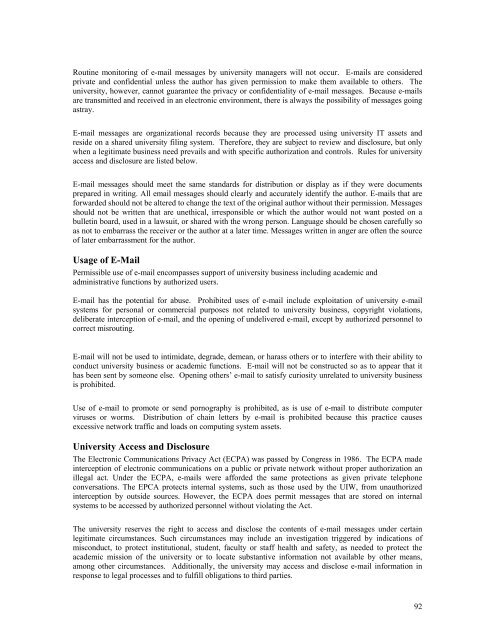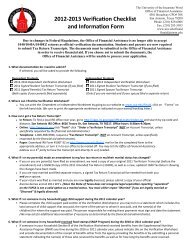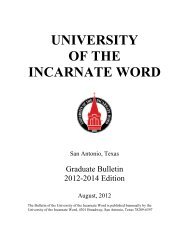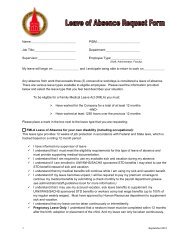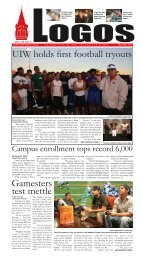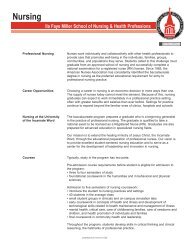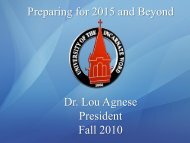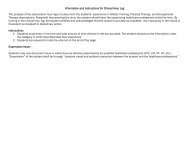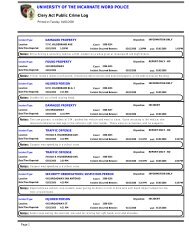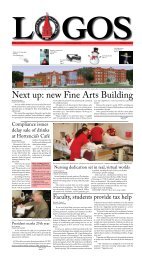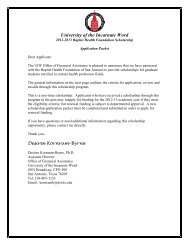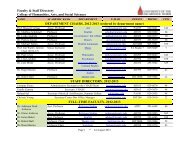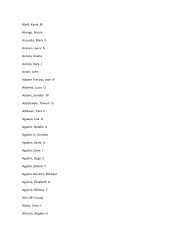2006-2007 Student Handbook - University of the Incarnate Word
2006-2007 Student Handbook - University of the Incarnate Word
2006-2007 Student Handbook - University of the Incarnate Word
You also want an ePaper? Increase the reach of your titles
YUMPU automatically turns print PDFs into web optimized ePapers that Google loves.
Routine monitoring <strong>of</strong> e-mail messages by university managers will not occur. E-mails are consideredprivate and confidential unless <strong>the</strong> author has given permission to make <strong>the</strong>m available to o<strong>the</strong>rs. Theuniversity, however, cannot guarantee <strong>the</strong> privacy or confidentiality <strong>of</strong> e-mail messages. Because e-mailsare transmitted and received in an electronic environment, <strong>the</strong>re is always <strong>the</strong> possibility <strong>of</strong> messages goingastray.E-mail messages are organizational records because <strong>the</strong>y are processed using university IT assets andreside on a shared university filing system. Therefore, <strong>the</strong>y are subject to review and disclosure, but onlywhen a legitimate business need prevails and with specific authorization and controls. Rules for universityaccess and disclosure are listed below.E-mail messages should meet <strong>the</strong> same standards for distribution or display as if <strong>the</strong>y were documentsprepared in writing. All email messages should clearly and accurately identify <strong>the</strong> author. E-mails that areforwarded should not be altered to change <strong>the</strong> text <strong>of</strong> <strong>the</strong> original author without <strong>the</strong>ir permission. Messagesshould not be written that are unethical, irresponsible or which <strong>the</strong> author would not want posted on abulletin board, used in a lawsuit, or shared with <strong>the</strong> wrong person. Language should be chosen carefully soas not to embarrass <strong>the</strong> receiver or <strong>the</strong> author at a later time. Messages written in anger are <strong>of</strong>ten <strong>the</strong> source<strong>of</strong> later embarrassment for <strong>the</strong> author.Usage <strong>of</strong> E-MailPermissible use <strong>of</strong> e-mail encompasses support <strong>of</strong> university business including academic andadministrative functions by authorized users.E-mail has <strong>the</strong> potential for abuse. Prohibited uses <strong>of</strong> e-mail include exploitation <strong>of</strong> university e-mailsystems for personal or commercial purposes not related to university business, copyright violations,deliberate interception <strong>of</strong> e-mail, and <strong>the</strong> opening <strong>of</strong> undelivered e-mail, except by authorized personnel tocorrect misrouting.E-mail will not be used to intimidate, degrade, demean, or harass o<strong>the</strong>rs or to interfere with <strong>the</strong>ir ability toconduct university business or academic functions. E-mail will not be constructed so as to appear that ithas been sent by someone else. Opening o<strong>the</strong>rs’ e-mail to satisfy curiosity unrelated to university businessis prohibited.Use <strong>of</strong> e-mail to promote or send pornography is prohibited, as is use <strong>of</strong> e-mail to distribute computerviruses or worms. Distribution <strong>of</strong> chain letters by e-mail is prohibited because this practice causesexcessive network traffic and loads on computing system assets.<strong>University</strong> Access and DisclosureThe Electronic Communications Privacy Act (ECPA) was passed by Congress in 1986. The ECPA madeinterception <strong>of</strong> electronic communications on a public or private network without proper authorization anillegal act. Under <strong>the</strong> ECPA, e-mails were afforded <strong>the</strong> same protections as given private telephoneconversations. The EPCA protects internal systems, such as those used by <strong>the</strong> UIW, from unauthorizedinterception by outside sources. However, <strong>the</strong> ECPA does permit messages that are stored on internalsystems to be accessed by authorized personnel without violating <strong>the</strong> Act.The university reserves <strong>the</strong> right to access and disclose <strong>the</strong> contents <strong>of</strong> e-mail messages under certainlegitimate circumstances. Such circumstances may include an investigation triggered by indications <strong>of</strong>misconduct, to protect institutional, student, faculty or staff health and safety, as needed to protect <strong>the</strong>academic mission <strong>of</strong> <strong>the</strong> university or to locate substantive information not available by o<strong>the</strong>r means,among o<strong>the</strong>r circumstances. Additionally, <strong>the</strong> university may access and disclose e-mail information inresponse to legal processes and to fulfill obligations to third parties.92


